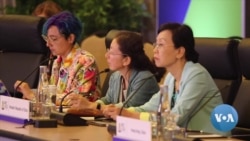ເຖິງແມ່ນວ່າ ຈະມີຄວາມກ້າວໜ້າບາງຢ່າງ ລຸນຫຼັງການລະບາດໃຫຍ່ຂອງພະຍາດໂຄວິດ-19 ກໍຕາມ, ແຕ່ການປິດຊ່ອງຫວ່າງລະຫວ່າງເພດ ໃນການມີສ່ວນຮ່ວມທາງດ້ານເສດຖະກິດ ອາດໃຊ້ເວລາຫຼາຍກວ່າ 130 ປີ, ອີງຕາມການກ່າວຂອງເຈົ້າໜ້າທີ່ອົງການ APEC. ບັນດາຜູ້ເຂົ້າຮ່ວມກອງປະຊຸມ
ການຮ່ວມມືເສດຖະກິດແມ່ຍິງເຂດເອເຊຍ-ປາຊີຟິກ ແລະສະພາເສດຖະກິດໃນນະຄອນຊີອາໂຕ ກໍໄດ້ສະແດງຄວາມກັງວົນ ກ່ຽວກັບຜົນກະທົບ ທີ່ບໍ່ສົມສ່ວນຈາກການປ່ຽນແປງຂອງດິນຟ້າອາກາດຕໍ່ບັນດາແມ່ຍິງ. ນາຕາຊາ ໂມສໂກວາຢາ (Natasha Mozgovaya) ມີລາຍງານເລື້ອງນີ້, ເຊິງ ທິບສຸດາ ມີຈະນຳເອົາລາຍລະອຽດ ມາສະເໜີທ່ານ ໃນອັນດັບຕໍ່ໄປ.
ບັນດາປະເທດໃນອົງການຮ່ວມມືທາງດ້ານເສດຖະກິດຂົງເຂດເອເຊຍ-ປາຊີຟິກ, ຫຼື APEC, ໄດ້ແບ່ງປັນຄວາມມຸ່ງໝັ້ນຕໍ່ສັງຄົມແລະການເລີ້ມຕົ້ນຢ່າງຫຼວງຫຼາຍ ເພື່ອຈັດການກັບຄວາມບໍ່ເທົ່າທຽມທາງເພດ. ແມ່ນແລ້ວ, ສະຖິຕິດັ່ງກ່າວ ໄດ້ມີການອະທິບາຍເຖິງຈຸດສໍາຄັນ ຢູ່ທີ່ກອງປະຊຸມສະພາເສດຖະກິດແມ່ຍິງ ໃນນະ ຄອນຊີອາໂຕ ໃນທ້າຍອາທິດແລ້ວນີ້ ເຖິງຈໍານວນຂອງວຽກທີ່ຍັງຄົງລໍຖ້າຢູ່ຂ້າງໜ້າ.
ທ່ານນາງແຊນເທລລາ ສແຕຣັດທ໌ຝອດ (Chantelle Stratford), ເຊິ່ງເປັນພາຄີທາງດ້ານນະໂຍບາຍກ່ຽວກັບແມ່ຍິງ ແລະເສດຖະກິດ ກ່າວວ່າ:
“ມັນຈະຕ້ອງໃຊ້ເວລາຫຼາຍກວ່າ 130 ປີເພື່ອປິດຊ່ອງຫວ່າງໃນການປະກອບສ່ວນທາງເພດຂອງໂລກ ແລະພວກເຮົາກໍຢູ່ຫ່າງ 300 ປີ ຈາກຄວາມເທົ່າທຽມທາງເພດ. ແຕ່ ການປິດຊ່ອງຫວ່າງໃນການມີສ່ວນຮ່ວມທາງເພດຂອງໂລກ ກໍອາດຈະເຮັດໃຫ້ມີການເພີ້ມຂຶ້ນຂອງຍອດຜະລິດຕະພັນລວມພາຍໃນ ຫຼື GDP ສູງເຖິງ 28 ຕື້ໂດລາ ເຊັ່ນກັນ, ຫຼືເກືອບ 17 ຕື້ໂດລາ ສໍາລັບຂົງເຂດອາເຊຍ-ປາຊີຟິກ. ຂ້າພະເຈົ້າບໍ່ມີຄວາມອົດທົນຮອດ 300 ປີ ຫຼື 130 ປີ ດັ່ງກ່າວນັ້ນ.”
ທ່ານນາງສະແຕຣັດຝອດ, ເປັນຫົວໜ້າພາຄີທາງດ້ານນະໂຍບາຍ ກ່ຽວກັບແມ່ ຍິງແລະເສດຖະກິດ, ໄດ້ອອກມາເຕືອນວ່າ ການເພີ້ມຄວາມເທົ່າທຽມທາງເພດ ເປັນເລື້ອງທີ່ຫຼໍ່ແຫຼມ, ຕ່າວປີ້ນໄດ້ ແລະບໍ່ສາມາດໄດ້ມາແບບງ່າຍ. ນຶ່ງໃນຫົວຂໍ້ທີ່ສໍາຄັນໃນວາລະການປະຊຸມນີ້ ແມ່ນການມີສ່ວນຮ່ວມທາງດິຈີຕອລ, ດ້ວຍຄໍາໝັ້ນສັນຍາ ແລະ ຄວາມສ່ຽງຂອງພວກເຂົາເຈົ້າ.
ດຣ. ກີຕ້າ ຣາວ ກຸບຕ້າ (Geeta Rao Gupta), ເອກອັກຄະລັດຖະທູດສະຫະລັດ ກ່ຽວກັບບັນຫາຕ່າງໆຂອງບັນດາແມ່ຍິງຢູ່ໃນທົ່ວໂລກ ກ່າວວ່າ:
“ຂ້າພະເຈົ້າໄດ້ເວົ້າກັບບັນດາແມ່ຍິງຫຼາຍໆຄົນ, ພຽງແຕ່ຖາມຄໍາຖາມພວກເຂົາເຈົ້າໂດຍລວມ ກ່ຽວກັບສິ່ງທ້າທາຍທີ່ພວກເຂົາເຈົ້າພະເຊີນໃນໜ້າທີ່ວຽກງານຂອງພວກເຂົາ. ແລະສິ່ງຫຼີກລ້ຽງບໍ່ໄດ້ກໍຄື ການລະເມີດໃນສິ່ງທີ່ເປັນເຄື່ອງອໍານວຍຄວາມສະດວກທາງດ້ານເທັກໂນໂລຈີ, ການລ່ວງລະເມີດທາງເພດອອນລາຍ ອາດຈະເອົາມາເປັນຫົວຂໍ້ໃນການສົນທະນາເຫຼົ່ານັ້ນ, ເຊິ່ງໄດ້ເຮັດໃຫ້ເສຍຄວາມຮູ້ສຶກ. ແລະໃນສະຖານະພາບປັດຈຸບັນຂອງຂ້າເຈົ້າທີ່ມີໜ້າ ທີ່ເປັນເອກອັກຄະລັດຖະທູດທົ່ວໄປ ສໍາລັບບັນຫາຕ່າງໆຂອງບັນດາແມ່ຍິງໃນທົ່ວໂລກ ຢູ່ກະຊວງການຕ່າງປະເທດຂອງສະຫະລັດ, ຂ້າພະເຈົ້າ ຕ້ອງການແທ້ໆ ທີ່ຈະນໍານັກຊ່ຽວຊານທາງດ້ານເທັກໂນໂລຈີທັງຫຼາຍເຂົ້າມາຮວມກັນ ເພື່ອຄິດຫາຫົນທາງຕ່າງໆ ສໍາລັບເພີ້ມຄວາມປອດໄພໃຫ້ແກ່ແມ່ຍິງ, ເນື່ອງຈາກເທັກໂນໂລຈີ ເປັນເຄື່ອງມືທີ່ສາມາດສ້າງໂອກາດຕ່າງໆ ໃຫ້ແກ່ແມ່ຍິງ
ຢ່າງຫຼວງຫຼາຍ.”
ຄວາມກັງວົນອີກຢ່າງນຶ່ງ ທີ່ໄດ້ຍົກຂຶ້ນມາເວົ້າຢູ່ໃນກອງປະຊຸມແມ່ນການປ່ຽນແປງຂອງດິນຟ້າອາກາດ ແລະຜົນກະທົບທີ່ບໍ່ສົມສົມສ່ວນຂອງການປ່ຽນແປງ ດັ່ງກ່າວທີ່ມີຕໍ່ແມ່ຍິງ.
ດຣ. ຣີເບັກກາ ໂຮບ (Rebecca Hope), ຜູ້ບໍລິຫານລະດັບສູງ (CEO) ຂອງອົງການ ວາຍລາບສ໌ (YLabs) ກ່າວວ່າ:
“ພວກເຮົາກໍາລັງເບິ່ງການຄາດການໃນທົດສະວັດຕໍ່ໄປ ພວກເຮົາກໍາລັງເຫັນປະຊາຊົນ 25 ລ້ານ ໃນ 1 ພັນລ້ານທີ່ກໍາລັງເຄື່ອນໄຫວ. ປັດຈຸບັນ, ແມ່ນຫຍັງຄືຄວາມໝາຍສໍາລັບແມ່ຍິງ ທີ່ຍັງໜຸ່ມເຫຼົ່ານັ້ນ? ພວກເຮົາຮູ້ວ່າ ລຸນຫຼັງໄພພິບັດກ່ຽວກັບແນວໂນ້ມທາງສັງຄົມ, ອັດຕາຄວາມຮຸນແຮງຕໍ່ແມ່ຍິງທີ່ເພີ້ມ ສູງຂຶ້ນ, ອັດຕາການແທ້ງລູກທີ່ບໍ່ປອດໄພ, ອັດຕາການຖືພາທີ່ບໍ່ໄດ້ວາງແຜນ. ພວກເຮົາຄາດວ່າ ໃນ 20 ປີຕໍ່ໜ້ານີ້, ແມ່ຍິງ 14 ລ້ານຄົນ ຈະສູນເສຍການເຂົ້າເຖິງການຄຸມກໍາເນີດ. ດັ່ງນັ້ນ ພວກເຮົາຄິດກ່ຽວກັບສິ່ງນີ້, ກ່ຽວກັບການດໍາເນີນງານຕ່າງໆຂອງແມ່ຍິງ ແລະພວກເຮົາຈະສະໜັບສະໜຸນເລື້ອງສຸຂະພາບຂອງພວກເຂົາເຈົ້າແນວໃດ.”
ອົງການ YLabs ແມ່ນອົງກອນອອກແບບ ແລະຄົ້ນຄວ້າລະດັບໂລກ ທີ່ເຮັດວຽກກ່ຽວກັບການແກ້ໄຂບັນຫາຕ່າງໆ ເພື່ອຍົກລະດັບໂອກາດທາງດ້ານສຸຂະ ພາບ ແລະດ້ານເສດຖະກິດ ສໍາລັບຄົນໜຸ່ມ. ຜູ້ບໍລິຫານລະດັບສູງ ດຣ. ໂຮບ ກ່າວຕໍ່ VOA ວ່າ ທ່ານນາງມອງເຫັນຄວາມເປັນໄປໄດ້ໃນການນໍາໃຊ້ເທັກໂນໂນຈີ ເພື່ອສະໜັບສະໜຸນເຂົ້າໃນການປ່ຽນແປງຂອງດິນຟ້າອາກາດ.
ດຣ. ໂຮບ ກ່າວວ່າ:
“ທາງເລືອກຄື ເພດສຶກສາທາງດ້ານດິຈິຕອລ, ການເຂົ້າເຖິງການສັ່ງຄຸມກໍາເນີດທາງດິຈິຕອລ, ການເບິ່ງແຍງສຸຂະພາບຈິດ ຂອງຕົນເອງທາງດິຈິຕອລ, ສຸຂະ ພາບຈິດ ທີ່ໄດ້ຮັບຜົນກະທົບໂດຍແນວໂນ້ມທາງສັງຄົມທີ່ຮຸນແຮງ, ແລະແນວໂນ້ມທາງສັງຄົມ ທີ່ປ່ຽນແປງຄົນໜຸ່ມ. ດັ່ງນັ້ນ, ຂ້າພະເຈົ້າຄິດວ່າ ຍັງມີໂອກາດຫຼາຍຢ່າງ ທີ່ຈະປັບປຸງຊ່ອງຫວ່າງໃນການເບິ່ງແຍງສຸຂະພາບ ເພື່ອສາມາດສະ ເໜີຕໍ່ຄົນໜຸ່ມ ໃຫ້ມີຫຼາຍທາງເລືອກ ໃນຊ່ອງທາງການເຂົ້າເຖິງການເບິ່ງແຍງດ້ານສຸຂະພາບ. ມັນບໍ່ໄດ້ມາແທນການບໍລິການທາງດ້ານສຸຂະພາບແບບດັ່ງເດີມ ແລະບັນດາພະນັກງານທາງການແພດທີ່ເກົ່າແກ່, ແຕ່ຂ້າພະເຈົ້າໝາຍເຖິງມັນຄືເຄື່ອງມືອີກອັນນຶ່ງ ໃນຊຸດເຄື່ອງມືຂອງພວກເຮົາ.”
ໃນຂະນະທີ່ມີການແບ່ງປັນຄວາມກັງວົນຫຼາຍໆຢ່າງທີ່ຄ້າຍຄືກັນ, ບໍ່ແມ່ນທຸກໆປະເທດທີ່ຈະມີການແກ້ໄຂບັນຫາຕ່າງໆໃນລັກສະນະທີ່ຄ້າຍຄືກັນ ຫຼື ພ້ອມທີ່ຈະດໍາເນີນການໃນຄວາມກ້າວໜ້າທີ່ຄ້າຍຄືກັນ. ບາງຄັ້ງ, ມັນມີລັກສະນະກ່ຽວກັບການຮັກສາບົດສົນທະນາດັ່ງກ່າວນີ້ ໃຫ້ດໍາເນີນຕໍ່ໄປ.
Despite some post-pandemic progress, closing global gender gaps in economic participation could take over 130 years, an APEC official says. Participants at the Asia-Pacific Economic Cooperation Women and the Economy Forum in Seattle also raised concerns about the disproportionate impact of climate change on young women. Natasha Mozgovaya has more.
Countries in the Asia-Pacific Economic Cooperation, known as APEC, share a public commitment and numerous initiatives to address gender inequality. Yet, statistics discussed at the Women and the Economy Forum in Seattle this weekend highlight the amount of work that still lies ahead.
Chantelle Stratford, APEC Policy Partnership on Women and the Economy
“It will take over 130 years to close global gender participation gaps. And that we are 300 years away from gender equality. But also, that closing the global gender gap in participation would add up to $28 trillion to global GDP, or nearly $17 trillion for the Asia Pacific. I don’t have 300 years, nor 130. I am getting impatient.”
Chantelle Stratford, APEC chair for Policy Partnership on Women and the Economy, warned that gains in gender equality are fragile, reversible and cannot be taken for granted. One of the main topics on the agenda was digital inclusion – with its promises and risks.
Dr. Geeta Rao Gupta, tells VOA she hopes concerns will help spur innovation and find solutions.
“I spoke to many women, just generally ask them the question of what are the challenges they face in their field. And inevitably, technology-facilitated harassment, online sexual abuse would come up in those conversations, which was upsetting. And as the in my current position as ambassador-at-large for Global Women's Issues in the Department of State in the United States, I want to really bring together technology experts to think about what are ways to increase women's safety, because technology is a tool that can offer women enormous opportunities.”
Another concern raised at the forum was climate change and its disproportionate impact on women.
Dr Rebecca Hope, YLabs CEO
“We're looking at a prediction that over the next decades we're going to see 25 million to 1 billion people on the move. Now, what does that mean for young women? We know that after climate disasters, rates of violence go up against women, rates of unsafe abortion, rates of unplanned pregnancy. We estimate that over the next 20 years that 14 million women will lose access to contraception. So we think about this, about women on the move and how we can support their health care.”
YLabs is a global design and research organization working on solutions to improve health and economic opportunity for young people. CEO Rebecca Hope told VOA she sees potential in employing techology to support climate resilience.
Dr Rebecca Hope, YLabs CEO
“Options like digital sex education, digital access to ordering contraception, digital self-care for mental health, mental health is severely impacted by climate disasters and climate change for young people. So I think there's opportunities to really innovate in the health care space, to be able to offer young people more options in the way that access health care. It's not a replacement for traditional health services and health workers, but I think it's another tool in our toolkit.”
While sharing many similar concerns, not all countries are on the same page with solutions – or ready to implement them at the same pace. Sometimes, it's about keeping the dialogue going.





